Introduction
So, you’ve received your offer letter and are now preparing for your student visa interview — congratulations!
This is the final step before you can begin your academic journey abroad.
But let’s be honest: visa interviews can be intimidating, especially when you’re not sure what to expect.
At GM EduGlobe Consult, we’ve guided hundreds of students through successful visa interviews for countries like Canada, the UK, the USA, and Australia.
In this guide, you’ll learn how to prepare, what to expect, and how to answer confidently — ensuring you walk into your interview ready to succeed.
Why the Visa Interview Matters
Visa officers conduct interviews to confirm three main things:
-
You are a genuine student.
-
You have sufficient financial support to study abroad.
-
You plan to return to your home country after your studies.
Once you understand what they’re looking for, it’s easier to shape your answers clearly and honestly.
Step-by-Step Preparation Tips
1. Know Your Course and School
Be ready to explain why you chose that particular course and institution.
Research the program structure, duration, and how it aligns with your future goals.
Example:
“I chose the Master’s in Business Management at the University of Wolverhampton because of its strong research focus and opportunities for industry placements, which align perfectly with my goal of becoming a business consultant.”
2. Understand Your Financial Plan
Visa officers want to be sure you can afford your studies.
Know your tuition fees, living expenses, and who’s sponsoring you.
Example:
“My father is sponsoring my studies. He’s a civil engineer earning an annual income of $35,000, which covers both tuition and living expenses. We’ve already paid part of the tuition as proof of commitment.”
3. Be Clear About Your Career Goals
You must demonstrate that your studies fit into a logical career plan.
Example:
“After completing my MBA, I plan to return to Nigeria to work with multinational firms like PwC or KPMG, where I can apply international business strategies in local markets.”
4. Organize Your Documents
Keep your documents in order — from your offer letter and academic transcripts to proof of funds and visa forms.
Use a clear folder and know exactly where each document is placed.
5. Practice Your Communication Skills
Confidence is key!
Practice answering questions in front of a mirror or with a friend.
Speak clearly, avoid memorized responses, and smile often.
6. Dress Professionally and Be Punctual
First impressions matter.
Dress neatly in business-casual attire and arrive early for your appointment.
Top 10 Common Visa Interview Questions — and How to Answer Them
| Question | Purpose | Sample Answer |
|---|---|---|
| 1. Why did you choose this country for your studies? | To check your motivation. | “I chose Canada because of its globally recognized education system, post-study work opportunities, and safe, multicultural environment.” |
| 2. Why this university/college? | To see if you researched your choice. | “GM EduGlobe Consult recommended this school based on my academic background. It offers hands-on learning and a strong graduate employment record.” |
| 3. What course are you going to study? | To ensure you know your program. | “I’ll be studying a Bachelor’s in Computer Science, focusing on Artificial Intelligence and Data Analytics.” |
| 4. How will this course help your future? | To confirm your goals are genuine. | “It will equip me with advanced skills to work as a data analyst and later pursue research or consulting roles.” |
| 5. Who is sponsoring your education? | To confirm financial stability. | “My parents are sponsoring me. They’ve set aside funds for my tuition and living costs.” |
| 6. What does your sponsor do? | To verify financial credibility. | “My mother owns a pharmacy and my father is an accountant. Together, their income comfortably supports my studies.” |
| 7. How much is your tuition and living cost per year? | To test if you’re financially prepared. | “My tuition is $15,000 per year and estimated living cost is around $10,000.” |
| 8. Do you plan to work while studying? | To ensure you understand visa limits. | “Yes, only part-time within the legal limit of 20 hours per week to gain experience, without affecting my studies.” |
| 9. What will you do after your studies? | To see if you intend to return home. | “I plan to return to my home country to apply my skills in developing local businesses and mentoring young entrepreneurs.” |
| 10. Have you been to this country before? | To verify travel experience. | “No, this will be my first time, but I’ve researched the culture and am well-prepared to adapt.” |
Bonus Tips from GM EduGlobe Consultants
- Always speak truthfully — honesty builds credibility.
- Avoid long or complicated answers; stay clear and concise.
- Maintain eye contact — it shows confidence and sincerity.
- If you don’t understand a question, politely ask, “Could you please repeat that?”
- Bring extra copies of your documents — you never know when they’ll be needed.
Final Thoughts
Your visa interview is not a test — it’s a conversation to confirm your genuine intent to study abroad.
With the right preparation and mindset, you can easily impress the visa officer and secure your study permit.
At GM EduGlobe Consult, we offer mock interview sessions, document reviews, and personalized coaching to ensure you are 100% ready.
Need Expert Help?
Don’t leave your future to chance.
Let GM EduGlobe Consult help you prepare and succeed in your visa interview.
- Website: www.gmeduglobeconsult.com
- Email: info@gmeduglobeconsult.com
- Call/WhatsApp: +[Insert contact number]
GM EduGlobe Consult — Your trusted partner in global education success.





